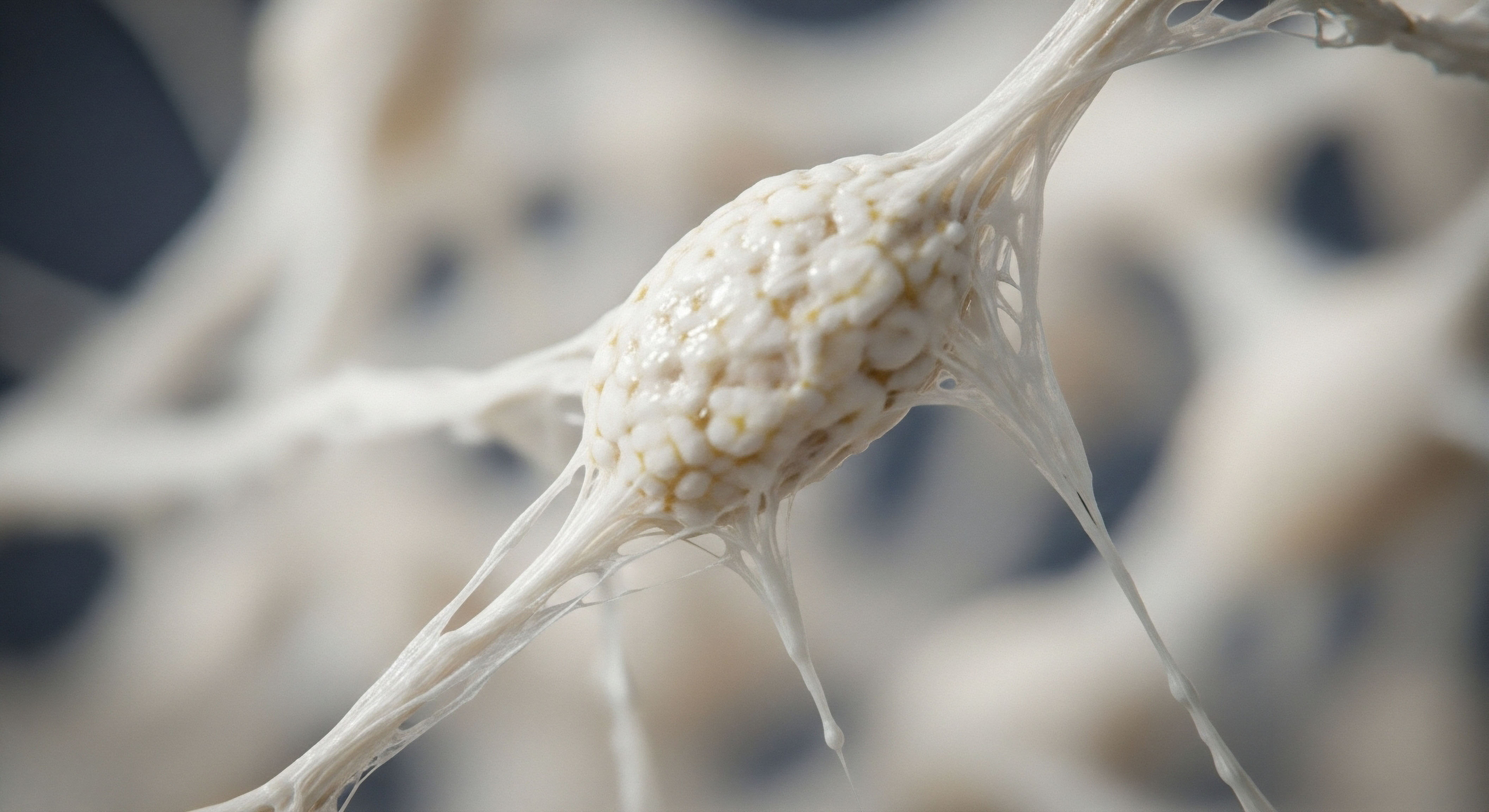

Your Brain Is Not Software to Be Hacked
The architecture of your consciousness, the speed of your thoughts, and the clarity of your memory are governed by a physical system. A biological reality. We have been conditioned to think of the mind as something to be tricked or “hacked” with clever shortcuts. This perspective is fundamentally limited.
Your brain is not software. It is the most sophisticated wetware on the planet, an intricate network of neurons, synapses, and glial cells operating in a constant, dynamic conversation with your body’s chemistry.
This conversation is directed by hormones. These molecules are the master conductors of your biological orchestra, and when their levels shift, the entire symphony of your cognitive function changes with them. The subtle but persistent brain fog you might experience, the frustrating search for a word that used to be at your fingertips, the blunting of your competitive edge ∞ these are not character flaws.
They are physiological signals. Your operating system is sending you data points indicating a need for recalibration at the hardware level.
Viewing the brain through this biological lens shifts the entire paradigm. The mission becomes one of targeted optimization. You move from seeking temporary fixes to architecting a superior biological foundation. This process begins with understanding that cognitive performance is an output. It is the end result of metabolic health, hormonal balance, and the regenerative capacity of your neural tissues. To upgrade the operating system, you must first upgrade the machine it runs on.


Recalibrating the Wetware
Upgrading your brain’s operating system is a process of systematic biological recalibration. It involves tuning the core systems that govern energy, signaling, and growth within your neural architecture. This is not about a single intervention, but a multi-layered protocol that compounds over time, building a foundation for sustained high-performance cognition. The approach is methodical, moving from the foundational to the highly specific, ensuring each layer supports the next.

The Foundational Layer Metabolic Machinery
Your brain consumes approximately 20% of your body’s energy, making metabolic health the bedrock of cognitive function. An unstable energy supply, characterized by glucose spikes and crashes, creates systemic inflammation and functional deficits that manifest as brain fog, fatigue, and poor concentration. The first step in any cognitive upgrade is to stabilize this energy grid.
This involves a precise calibration of diet and lifestyle to enhance insulin sensitivity and promote metabolic flexibility, allowing your brain to efficiently use both glucose and ketones for fuel. A metabolically healthy brain is a resilient and energized brain.

The Signaling System Hormonal Conductors
Hormones are the chemical messengers that dictate the function of your neural “hardware.” Their decline with age is a primary driver of cognitive slowdown. Restoring these signals to youthful levels is akin to upgrading your computer’s internal components, allowing for faster processing and greater efficiency. The loss of sex hormones during aging can lead to mitochondrial dysfunction, neuroinflammation, and synaptic decline.
De-synchronization of your hormonal rhythms is a key driver of accelerated brain aging and cognitive decline.
- Pregnenolone The Master Precursor. Often called the “mother hormone,” pregnenolone is a foundational building block for many other critical hormones. Within the brain, it functions as a powerful neurosteroid, directly modulating NMDA receptors involved in learning and memory. Optimizing pregnenolone levels provides the raw material necessary for a resilient and adaptive neural environment.
- Testosterone The Drive And Focus Modulator. This hormone is a powerful modulator of the central nervous system. Testosterone and its metabolites are known to be neuroprotective. It directly influences dopamine production, the neurotransmitter of motivation, drive, and focus. Calibrating testosterone to optimal ranges enhances mental assertion, sharpens the competitive edge, and fortifies the neural circuits that govern executive function.
- Estrogen The Synaptic Architect. Estradiol, the primary estrogen, is a master regulator of synaptic plasticity, particularly in the hippocampus and prefrontal cortex. It facilitates the growth of new synaptic connections and maintains the health of existing ones, a process essential for memory consolidation and verbal fluency. Its decline is directly linked to cognitive changes, and proper regulation is critical for maintaining a dense and efficient neural network.

The Growth Factor Protocols Installing New Code
The final layer of the upgrade involves directly stimulating the brain’s innate capacity for growth and repair. This is achieved by activating specific proteins known as neurotrophic factors, which act as fertilizer for your brain cells. The most significant of these is Brain-Derived Neurotrophic Factor (BDNF). BDNF is a protein that supports the growth of new neurons (neurogenesis) and synapses, fortifying your brain against decline and enhancing its ability to learn and adapt.
Higher levels of BDNF can increase cognition, mood, productivity and memory.
While lifestyle factors like high-intensity exercise and caloric restriction are potent BDNF activators, advanced peptide protocols offer a more direct and powerful tool for this biological upgrade. Peptides are small chains of amino acids that act as precise signaling molecules, instructing cells to perform specific functions. Nootropic peptides are designed specifically to enhance cognitive function, often by dramatically increasing the expression of BDNF.
| Peptide Protocol | Primary Mechanism | Targeted Cognitive Outcome |
|---|---|---|
| Cerebrolysin | A complex of neuro-peptides and amino acids derived from purified brain proteins. Mimics the action of natural neurotrophic factors. | Global improvement in cognitive function, neuroprotection, and enhanced synaptic density. Used for recovery and broad cognitive support. |
| Semax | Increases BDNF and other neurotrophic factors in the brain. Modulates serotonin and dopamine systems. | Enhanced focus, mental clarity, and memory formation without stimulant effects. Improves stress resilience and concentration. |
| Selank | An anxiolytic peptide that modulates the GABA system and influences the expression of BDNF. | Reduces anxiety and mental tension while improving cognitive function. Creates a state of calm focus. Often paired with Semax. |
| Dihexa | A highly potent peptide that activates the HGF/c-Met pathway, which is critical for neural regeneration. It is reported to be exceptionally more powerful than BDNF alone. | Profound enhancement of synaptic formation, memory consolidation, and mental endurance. Aimed at significant cognitive repair and enhancement. |


The Architecture of a High Performance Mind
The decision to initiate a cognitive upgrade protocol is a function of performance, not chronology. The process begins when the signals of a suboptimal operating system become apparent. These are the moments when mental friction increases, when processing speed feels throttled, or when the seamless recall of information develops static. It is a proactive choice made at the point where you identify a gap between your current cognitive output and your desired standard of performance.

Initializing the Upgrade
You consider this path when the demand for high-level problem-solving, creativity, and mental endurance becomes a consistent part of your life. It is for the executive navigating complex strategic decisions, the creative professional who relies on fluid ideation, or any individual who recognizes that their cognitive capacity is their primary asset.
The entry point is a personal assessment of performance blockers. It is a recognition that the hardware requires a tune-up to run the increasingly complex software of modern life.

Rendering the Results
The timeline for a tangible cognitive upgrade unfolds in distinct phases, as the biological systems respond to the new inputs. The initial effects are often felt within the first month, as foundational metabolic and hormonal calibrations take hold. This manifests as more stable energy levels throughout the day, a reduction in brain fog, and an improved sense of well-being and mental clarity. It is the feeling of the system coming online with a clean power supply.
Over the subsequent two to six months, the more profound architectural changes begin to solidify. As peptide protocols stimulate BDNF and enhance synaptic plasticity, you will notice distinct improvements in memory recall, learning speed, and the ability to form novel connections between ideas. This is the period where the “wetware” is actively being rewritten and reinforced.
Complex information becomes easier to integrate, and mental resilience under pressure is markedly stronger. This is the direct result of building a more robust and interconnected neural network.
Beyond the first year, these adaptations coalesce into a new, elevated baseline. The goal is a sustained state of high-performance cognition, where mental clarity, sharp focus, and effortless recall are the default settings. This is the long-term architecture of a mind that is not just maintained, but actively and continuously optimized. It is a system built for adaptability, resilience, and sustained output at the highest level.

Your Cognition Is a Choice
The human brain is the last frontier of personal agency. For generations, we accepted its gradual decline as an inevitability. That era is over. We now possess the tools and the understanding to treat our cognitive architecture as a dynamic system that can be measured, managed, and upgraded.
The process of optimizing your brain’s operating system is the ultimate expression of proactive wellness. It is the deliberate act of shaping the very lens through which you experience reality. The quality of your thoughts determines the quality of your life, and for the first time, the biological substrate of those thoughts is within your control.

Glossary

cognitive function

brain fog

pregnenolone

synaptic plasticity

nootropic peptides




